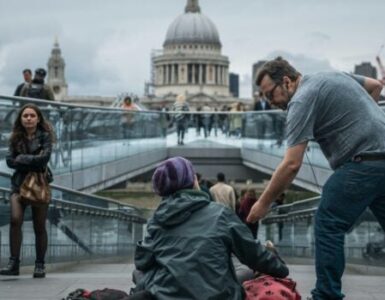Anna Tabeling squinted against the brutal sun blazing on the Utah desert. As she took in the desert stretching out before her, her heart sank. Although she was on an outdoor trip with her group from Wyoming Catholic College, during this moment of prayerful reflection, the stark loneliness of the desert overwhelmed her.
“I remember sitting on a little rock ledge and staring out and feeling absolutely alone and barren. My soul felt like the desert I was staring at,” Tabeling recalled.
Suddenly, she noticed what appeared to be tiny sandcastles everywhere.
“There were hundreds of little organisms every inch: cryptobiotic soil, this little organism that’s growing on the dirt, that looks like sandcastles,” she said. “I’d been staring out into desert feeling like it was a wasteland, and realized it’s full of life – I’d just not been seeing.”
“I’d just not been seeing” – that’s what many students at Wyoming Catholic College recognized after experiencing WCC’s special technology policy.
Kyle Washut, the Academic Dean at WCC, explained the technology policy requires students to “check in their cellphones” every year.
“As a general rule, we discourage the regular use of the internet,” Dean Washut said, but the internet is available for essentials such as calling home and paying bills.
“We don’t think of it as a crazy anti-technology policy,” he stated. “We think of it as doing what was normal even twenty years ago.”
Dean Washut added, “Freshmen are accustomed to cell phone culture. They’re familiar with that experience, so we don’t need to familiarize them with it.” Instead, WCC encourages students to contemplate, “are there habits we’ve created because of technology that aren’t as conducive to community? But it’s hard to know if you’re always immersed in it.”
That’s where the technology policy comes in.
To many, this policy may sound foolish.
However, rising sophomore Michael Barrow remarked, “Many people say this, and it’s true: many of my friends and classmates consider the technology policy to be a very important reason why they chose to attend.”
What is it that draws contemporary students to experience WCC’s technology policy? In this article, we’ll discuss the policy’s goals; testimonials on the remarkable ways the policy serves education and shapes the WCC community; and the astonishing influence on students’ lives outside of school.
A Policy with a Purpose
According to Tabeling, now a rising junior: “The technology policy is one of the most enchanting and beautiful parts of the college. The education wouldn’t be the same without it.”
Julian Kwasniewski, Marketing and Communications Coordinator at WCC and a former student, spoke about the goals of the policy.
He stated that WCC’s standout feature is the way in which they combine Catholic tradition, book education, and experience of the outdoors to “form students, their mind, their body, and their spirit.”
However, Kwasniewski said that WCC realizes that instructing students or simply giving them opportunities to discover the natural world isn’t sufficient.
He stated that WCC borrowed from the theories of 1970s teacher John Senior. As Kwasniekwsi stated, Senior believed “modern man was so out of touch with reality because of the technological and artificial world he was living in, that people couldn’t even really understand great authors like St. Augustine or St. Thomas Aquinas – not because their reason was defective, but because their experience of reality was so far removed from ancient authors, or even reality itself.”
“Before students start studying St. Thomas Aquinas or philosophy,” Kwasniewski said, “they need to get out of air-conditioned rooms and experience the Real again with a capital R.”
WCC students are witnesses to numerous educational perks stemming from the technology policy.
“The longer I was at school, my thoughts and my conversations became longer and had more substance to them,” rising junior Anne Cocker said, “to the point that I was almost able to hold a whole essay in my mind, and structure it in my mind, before it was written out!”
Dean Washut noted that because email usage is not the standard, “students are not perpetually on call to professors.”
The technology policy even influences the way that students complete their homework! For example, Tabeling and her friends enjoy reading books out loud together.
“It’s really easy to read Dante and just be an observer, and not actually enter into that journey and realize this is the journey you are on,” Tabeling said. “It’s really easy to read the Scriptures and look at God and not let yourself encounter Him. Encounters are the goal of the school – the way we form ourselves in body, mind, and spirit into disciples of Christ.”
Another example is that Cocker believes that the technology policy can result in increased emotional intelligence.
Upon returning home, she noticed that “people faced with difficult situations would say, “Oh sadness” or “Oh crying face” – and I would think, you’re not saying anything, you’re just describing an emotion.”
Cocker also mentioned how a fellow student remarked, “all too often, a kind of way of coping with difficulty is just grabbing our phone and scrolling, and not dealing with the issue – but that, by putting them aside during school, your emotions are stronger because you’re faced with difficult situations, and the only way you face them is to actually face them.”
She added, “And if you weren’t able to do that on own, you can take it to the Lord, and you have your community to support you, because they’ve also made the decision to set aside these distractions not only for themselves, but for the community.”
Bolstering a dynamic community
Cocker remembers, chuckling, that when she entered as a freshman, “a little sneak peek” of the technology policy’s effects on the WCC community is an occurrence that’s become a rare phenomenon in the outside world: “You walk into any building and students greet you! They’re not on their phones.”
What on earth do the students do for entertainment, you might wonder? Far from lounging around in boredom, the community fills up the time left open by the technology policy in a variety of remarkable ways.
“An awakened eagerness for doing things just because you love them has been big result for me,” Tabeling said.
She recalled a weekend “adventure” during a school break in which she and a group of female friends from WCC went backpacking up a mountain to have a formal picnic. Tabeling listed some of the items the friends packed, including dresses and high heels, china dishes, cloth napkins, and wine glasses. They feasted on sandwiches, sparkling juice, dainty desserts, and more!
Barrow enjoys watch parties on school weekends. Watching movies together “has been a great source of community building,” he said, “because we can use technology towards the end of creating community.”
Cocker added, “When you watch movies with someone else, it’s like parallel lines. You don’t interact with that person.” During Friday movie nights, however, “they break parallel lines, interact with each other. They talk about the movie for thirty minutes or an hour.”
Tabeling cherishes the memory of a particular week before leaving WCC for the summer and the unique way that she and her friends expressed their goodbyes.
“We had a bonfire, listening to friends singing farewell, singing far into the night,” she said. “It’s a beautiful gift of community.”
She added that the technology policy has helped to teach her that “you’re made for communion. You don’t realize you’re missing it until technology is pulled away from you and the world gets turned on its head.”
Outside the “bubble”
Does the technology policy have any applications in the outside world?
After all, Tabeling said, “At school, it’s kind of a little bubble, but that’s not what it’s going to be at home. You can’t bulldoze people and say, ‘Get rid of all these things.’”
Nor is that the goal of the technology policy. As Barrow said, “You learn how to properly use technology.”
Although Tabeling has experienced challenges in sharing what she’s learned with “patience,” she also believes “it changed how I interact with people at home. I take so much more joy sitting and talking, doing simple things, and building community even while folding laundry and cleaning the family room!”
Barrow has also noticed a dramatic shift in his outlook. Before entering freshman year, he participated in Students for Life’s National Leadership Collective, a pro-life gathering that coincided with the overturning of Roe v. Wade. He said he “tried to capture all the events when Roe v. Wade was reversed and all the other great experiences, to try to immortalize them with technology.”
This summer, he participated in the same event – and was stunned by the difference in his habits. Rather than relying on technology, Barrow was “connecting with people in conversation and community in a much more deep and profound way than previously.” He had been “missing out on the deep and powerful experience of connecting with others and instead trading it for a shadow of that.”
Closing Thoughts
As Barrow stated, “It’s easy to judge a school like WCC harshly for having such a revolutionary technology policy, but I’ll say this: it’s not revolutionary, it’s just a return to what used to be normal, face-to-face conversation.”
WCC’s technology policy motivates not only the school community to flourish, but also provides students with spiritual, intellectual, social, and emotional skills necessary to make an impact on their home communities and to be responsible users of technology.
Furthermore, the ideas behind the technology policy are even more widespread. Dean Washut cited examples such as Franciscan University’s “Unplugged Scholarship” and secular media’s reports on how technology can adversely influence students’ mental health.
Barrow believes the story of WCC’s technology policy comes with an invitation to others.
“I think no one needs to take it from me, or anyone else who’s had the blessing to experience the technology policy,” he said. “They should try it for themselves.”
He added, “I think if people are daring and countercultural enough to give themselves a bit of a technology fast, they’ll find it’ll give them such a joyful and deeper encounter with reality itself.”
Image by Peter Silverman Photo on Shutterstock












